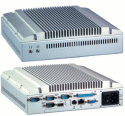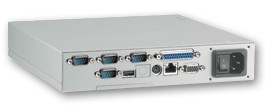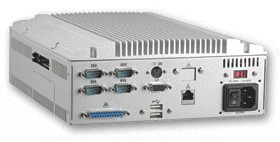Fanless rugged systems run Linux at temperature extremes
May 3, 2005 — by Henry Kingman — from the LinuxDevices Archive — views Axiomtek has expanded its line of rugged, fanless computers with additional processor options and extended temperature versions. The eBOX series of computers are packaged in heavy-duty, aluminum and stainless steel housings and support both run Linux.
Axiomtek has expanded its line of rugged, fanless computers with additional processor options and extended temperature versions. The eBOX series of computers are packaged in heavy-duty, aluminum and stainless steel housings and support both run Linux.
(Click here for larger image of the eBOX746-EFL)
The three devices are implemented using different processors, as indicated below, but share many features, according to Axiomtek. The common features include:
- Processor and memory — see individual models, described below
- I/O ports:
- 3 RS232 serial ports, 1 RS232/422/485 port
- RJ45 10/100 Ethernet
- USB
- VGA port
- Parallel printer port
- PS/2 keyboard/mouse
- Expansion:
- 2.5 inch HDD drive bay
- Type II CompactFlash slot
- Power — operate from both AC and DC power sources
- Optional DIN rail wall mounting kit
- Temperature range — see individual models, described below
The three devices are further differentiated as follows . . .
eBOX746-EFL
This is an extended temperature version of the eBOX746-FL (pictured above) which was introduced last November. It is available with Via Eden ULP processors ranging from 400 to 1000 MHz, and operates between -25 and +50 degrees C. It comes standard with 256 MB of SODIMM SDRAM expandable to 512MB.
eBOX745-EFL
 This device is based on a 300 MHz Geode processor, and is the most cost-effective option when “I/O points” are more important than processing power, according to Axiomtek. It offers the same feature set as the eBOX746-EFL, and operates between -25 and +60 degrees C. A variation, the eBOX745A-EFL, substitutes a second RJ45 Ethernet port for two of the RS232 ports.
This device is based on a 300 MHz Geode processor, and is the most cost-effective option when “I/O points” are more important than processing power, according to Axiomtek. It offers the same feature set as the eBOX746-EFL, and operates between -25 and +60 degrees C. A variation, the eBOX745A-EFL, substitutes a second RJ45 Ethernet port for two of the RS232 ports.
eBOX738-FL
 The eBOX738-FL is available with either a Celeron M processor at 600 MHz or a Pentium M at 1.4 GHz. It supports up to 1 GB or RAM and operates between -25 and +50 degrees C. PCMCIA is supported through an optional PC/104+ module.
The eBOX738-FL is available with either a Celeron M processor at 600 MHz or a Pentium M at 1.4 GHz. It supports up to 1 GB or RAM and operates between -25 and +50 degrees C. PCMCIA is supported through an optional PC/104+ module.
This article was originally published on LinuxDevices.com and has been donated to the open source community by QuinStreet Inc. Please visit LinuxToday.com for up-to-date news and articles about Linux and open source.